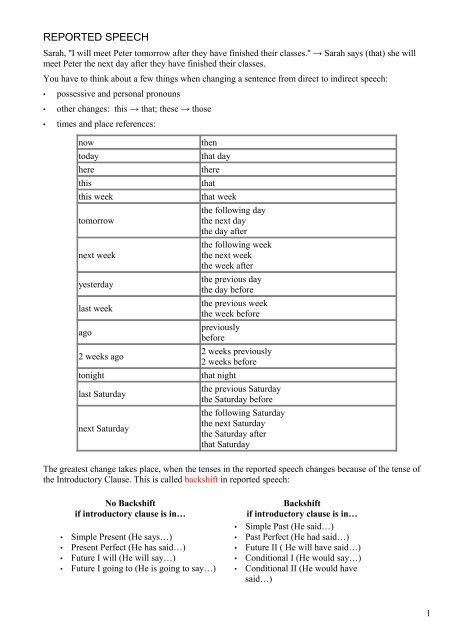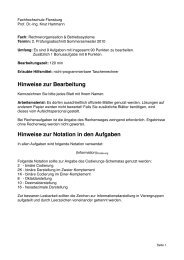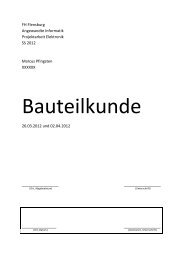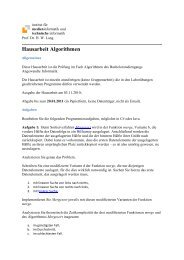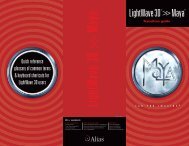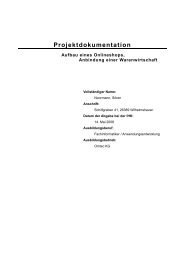REPORTED SPEECH
REPORTED SPEECH
REPORTED SPEECH
Create successful ePaper yourself
Turn your PDF publications into a flip-book with our unique Google optimized e-Paper software.
<strong>REPORTED</strong> <strong>SPEECH</strong><br />
Sarah, ''I will meet Peter tomorrow after they have finished their classes.'' → Sarah says (that) she will<br />
meet Peter the next day after they have finished their classes.<br />
You have to think about a few things when changing a sentence from direct to indirect speech:<br />
• possessive and personal pronouns<br />
• other changes: this → that; these → those<br />
• times and place references:<br />
now<br />
today<br />
here<br />
this<br />
this week<br />
tomorrow<br />
next week<br />
yesterday<br />
last week<br />
ago<br />
2 weeks ago<br />
tonight<br />
last Saturday<br />
next Saturday<br />
then<br />
that day<br />
there<br />
that<br />
that week<br />
the following day<br />
the next day<br />
the day after<br />
the following week<br />
the next week<br />
the week after<br />
the previous day<br />
the day before<br />
the previous week<br />
the week before<br />
previously<br />
before<br />
2 weeks previously<br />
2 weeks before<br />
that night<br />
the previous Saturday<br />
the Saturday before<br />
the following Saturday<br />
the next Saturday<br />
the Saturday after<br />
that Saturday<br />
The greatest change takes place, when the tenses in the reported speech changes because of the tense of<br />
the Introductory Clause. This is called backshift in reported speech:<br />
No Backshift<br />
if introductory clause is in…<br />
• Simple Present (He says…)<br />
• Present Perfect (He has said…)<br />
• Future I will (He will say…)<br />
• Future I going to (He is going to say…)<br />
Backshift<br />
if introductory clause is in…<br />
• Simple Past (He said…)<br />
• Past Perfect (He had said…)<br />
• Future II ( He will have said…)<br />
• Conditional I (He would say…)<br />
• Conditional II (He would have<br />
said…)<br />
1
Basic tense chart<br />
The tenses generally move backwards in this way (the tense on the left changes to the tense on the right):<br />
present simple<br />
I'm a teacher.<br />
present continuous<br />
I'm having lunch with my parents.<br />
present perfect simple<br />
I've been to France three times.<br />
present perfect continuous<br />
I've been working very hard.<br />
past simple<br />
I bought a new car.<br />
past continuous<br />
It was raining earlier.<br />
past perfect<br />
The play had started when I arrived.<br />
past perfect continuous<br />
I'd already been living in London for five years.<br />
past simple<br />
He said he was a teacher<br />
past continuous.<br />
He said he was having lunch with his parents.<br />
past perfect simple<br />
He said he had been to France three times.<br />
past perfect continuous<br />
He said he had been working very hard.<br />
past perfect<br />
He said he had bought a new car.<br />
past perfect continuous<br />
He said it had been raining earlier.<br />
past perfect<br />
NO CHANGE POSSIBLE<br />
past perfect continuous<br />
NO CHANGE POSSIBLE<br />
Other verb forms<br />
Other verb forms also sometimes change:<br />
will<br />
I'll come and see you soon.<br />
can<br />
I can swim under water for two minutes.<br />
must<br />
All tickets must be bought in advance.<br />
shall<br />
What shall we do about it?<br />
may<br />
May I smoke?<br />
would<br />
He said he would come and see me soon.<br />
could<br />
He said he could swim under water for two minutes.<br />
had to<br />
He said that all tickets had to be bought in advance.<br />
should<br />
He asked what we should do about it.<br />
might<br />
He asked if he might smoke.<br />
Things are slightly more complicated with imperatives.<br />
positive imperative<br />
Shut up!<br />
negative imperative<br />
Don't do that again!<br />
imperatives as requests<br />
Please give me some money.<br />
tell + infinitive<br />
He told me to shut up.<br />
tell + not + infinitive<br />
He told me not to do it again.<br />
ask + infinitive<br />
He asked me to give him some money<br />
2
Questions<br />
Note that instead of ‚that‘ you use the interrogative. If there is no interrogative, use ‚whether‘ / ‚if‘.<br />
Direct Speech<br />
Reported Speech<br />
statement He said: “She lives in London.“ He said that she lived in London<br />
question with<br />
interrogative<br />
He asked:“Where does she live?“ He asked where she lived.<br />
He asked whether she lived in<br />
question without He asked: “Does she live in<br />
London.<br />
interrogative<br />
London?“<br />
He asked if she lived in London<br />
• The verbs you use in the introductory clause are basic ones like say, tell, reply, and ask.<br />
• But you can also use other reporting verbs<br />
Some basic reporting verbs<br />
to accuse<br />
"It was you who ate my chocolate, Elvira, wasn't it?" → He accused Elvira of eating his chocolate.<br />
admit<br />
"OK, it was me. I ate your chocolate" → Elvira admitted eating the chocolate. / Elvira admitted that she<br />
had eaten the chocolate.<br />
advise<br />
"Well, if I were you I'd start saving for my retirement." → He advised me to start saving for my<br />
retirement<br />
agree<br />
"Yes, you're right, it's a terrible problem." → She agreed that it was a terrible problem.<br />
announce<br />
"I'm afraid I've got some bad news. The company's closing." → The manager announced that the<br />
company was closing.<br />
apologise<br />
"I'm sorry I didn't get to the meeting." → He apologised for not going to the meeting.<br />
ask<br />
"It's very hot in here. Would you mind opening the window?" → She asked him to open the window.<br />
blame<br />
"We lost the match because you didn't save that penalty." → He blamed the goalkeeper for losing the<br />
match.<br />
complain<br />
"The electrician said he was coming at ten o'clock so I took time off work and waited in all morning...."<br />
→ She complained about the electrician.<br />
congratulate<br />
"Well done! I knew you'd pass your driving test this time." → She congratulated him on passing his<br />
driving test.<br />
deny<br />
"It most certainly wasn't me that left the front door open." → He denied leaving the front door open./ He<br />
denied that he had left the front door open.<br />
3
explain<br />
"Sorry I'm late. The traffic was bad and then I couldn't find a parking space." → He explained why he<br />
was late./<br />
He explained that the traffic was bad.<br />
forget<br />
"Oh no, I haven't got any money. I didn't go to the bank." → He forgot to go to the bank.<br />
invite<br />
"Would you like to come to our house for dinner on Friday? → He invited them to come to dinner on<br />
Friday.<br />
offer<br />
"Those bags must be heavy, John. Shall I take one?" → She offered to carry a bag for him.<br />
promise<br />
"Yes, honest, I'll be there on time. I won't be late." → He promised not to be late.<br />
refuse<br />
"Well I'm not washing up. I did it last time." → He refused to do the washing-up.<br />
remind<br />
"Remember you have to go to the bank. You forgot yesterday." → She reminded me to go to the bank.<br />
suggest<br />
"Why don't you go to the dentist if your tooth hurts?" → She suggested that he should go to the<br />
dentist./She suggested that he went to the dentist.<br />
threaten<br />
"If you're late again we'll start without you." → They threatened to start without him.<br />
warn<br />
"Don't drive too quickly. The streets are very icy." → He warned him about the ice./ He warned him not<br />
to drive too quickly.<br />
Exercise 1: Put the sentences into reported speech.<br />
1) ''I ride my bike every day.'' => John says ...<br />
2) ''My husband and I have never been to Paris.'' => Mrs Petersen stressed ...<br />
3) ''Can you drive a van“ => I was asked ...<br />
4) ''When will she arrive?'' => He wants to know ...<br />
5) ''Give me this book!'' => She tells him ...<br />
6) ''We have enough to eat.'' => They pointed out ...<br />
7) ''We were in London last year.“ => They said ...<br />
8) ''We are redecorating our flat this week.'' => Sarah explains ...<br />
4
9) ''Will you help me with these boxes?“ => I'm asking you ...<br />
10) ''Timmy, buy some rolls!'' => His mother told Timmy...<br />
Exercise 2: Translate the sentences into English.<br />
I. Er sagte, er sei sehr krank.<br />
II. Sie fragte, ob sie ihm helfen könne.<br />
III. Mary fügte hinzu, dass sie heißen Tee machen werde.<br />
IV. Die Browns erklärten, sie seien schon oft in London gewesen.<br />
V. Er forderte sie auf, mehr zu arbeiten.<br />
VI. Er wollte wissen, wann wir essen.<br />
Exercise 3:<br />
Exercise 4: Change the sentences to direct speech.<br />
a) She asked me to bring the book that night.<br />
b) Peter told me that they had gone out the night before.<br />
c) Andrew said to me that he couldn't help me the next day.<br />
d) He told me he would visit his parents that weekend.<br />
e) She asked me if I had studied reported speech before.<br />
f) His mother told him to do the washing-up.<br />
5


